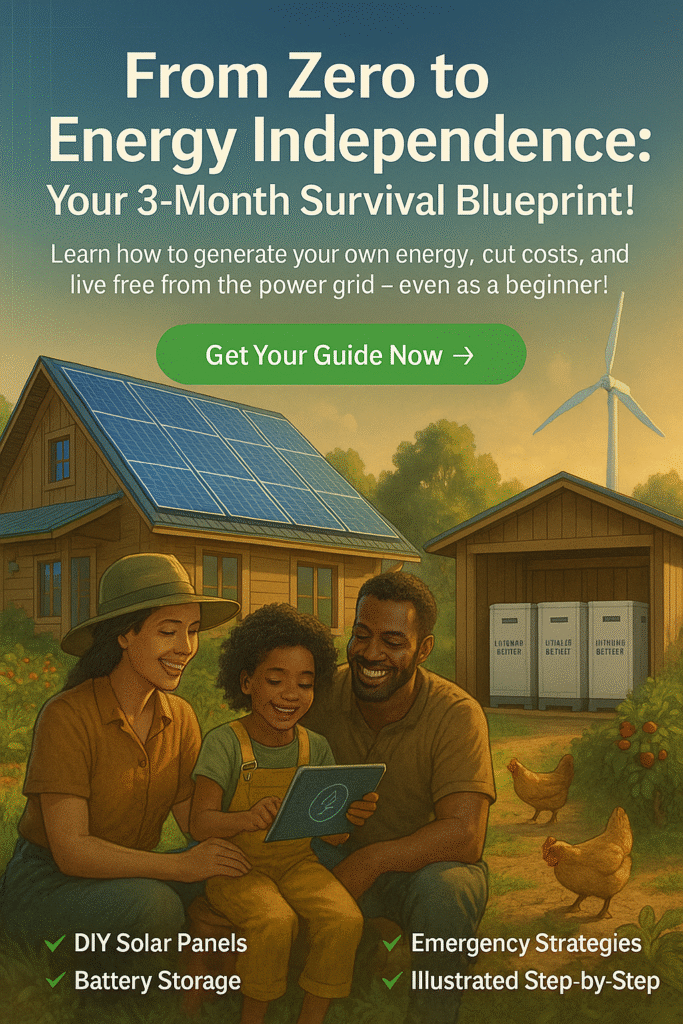
Going off-grid is an exciting step toward independence, resilience, and sustainability. But many new adopters fall into costly and frustrating traps that are avoided with the right knowledge. In this guide, we’ll uncover the Top 7 Mistakes to Avoid When Setting Up Off-Grid Energy Systems. We will also explain how to build a system that works reliably for years to come.
Mistake #1 – Underestimating Energy Needs
One of the most common errors is underestimating how much energy you actually use. People often dream of a solar-powered cabin or van. They forget to account for everyday appliances, charging devices, lighting, and heating.
What Goes Wrong:
If your energy system can’t keep up with your usage, you’ll constantly run out of power. This leads to relying on backup generators more often, which undermines the purpose of going off-grid.
How to Avoid It:
Conduct a thorough energy audit. List every device you use, its wattage, and how many hours per day it runs. Multiply and sum everything for a realistic daily energy total.
Example:
- Laptop: 60W × 5 hrs = 300Wh
- Fridge: 120W × 24 hrs = 2,880Wh
- Lights: 10 bulbs × 10W × 5 hrs = 500Wh
Daily total = 3,680Wh (or 3.68kWh)
Now you know your baseline. Plan your system suitably.
Mistake #2 – Choosing the Wrong Battery Bank
Batteries are the heart of any off-grid energy system, and selecting the wrong type can cripple your setup.
What Goes Wrong:
- Cheap batteries die quickly.
- Wrong chemistry leads to poor performance.
- Undersized banks limit daily usage.
How to Avoid It:
Learn about the three main battery types:
- Lead-acid (flooded): Cheap but heavy, high maintenance.
- AGM: Sealed, safer, mid-cost.
- Lithium (LiFePO4): Lightweight, fast charging, long life, higher cost.
When in doubt, invest in quality lithium batteries. They may cost more upfront but save money over time.
📘 For a deeper dive, read Battery Banks Demystified: The Heart of Off-Grid Power.
Mistake #3 – Going Solar-Only Without Backup
While solar energy is the most popular choice, relying solely on solar panels is a major risk. This is especially true in regions with long winters or unpredictable weather.
What Goes Wrong:
- Days without sunshine can deplete your batteries.
- Solar performance drops in snow, rain, or heavy cloud cover.
How to Avoid It:
Consider hybrid systems that combine solar with:
- Wind power (ideal in windy regions)
- Micro-hydro (excellent for flowing water sources)
- Backup generators (diesel, propane, or biogas)
Redundancy ensures you’re never left in the dark.
🔗 Learn more in The Ultimate Guide to Off-Grid Power: Solar, Wind, and Beyond.
Mistake #4 – Poor System Sizing and Configuration
A system that’s too big is a waste of money. One that’s too small will constantly fail. Getting the right balance of size and compatibility is key.
What Goes Wrong:
- Panels don’t match charge controller specs.
- Inverters are undersized for demand.
- Batteries are overworked.
How to Avoid It:
- Use solar calculators to size systems correctly.
- Follow equipment manuals and compatibility guides.
- Consult with professionals or experienced off-grid users.
Example: A kW inverter should handle a peak of 2.4–2.kW continuous load to run efficiently.
Mistake #5 – Ignoring Local Climate and Terrain
You must adapt your setup to your specific location. What works in sunny Arizona will fail miserably in cloudy Oregon or mountainous terrain.
What Goes Wrong:
- Shade from trees or buildings limits solar output.
- Low wind zones reduce turbine efficiency.
- Frozen water impacts micro-hydro systems.
How to Avoid It:
- Use satellite tools (like Watts) to assess solar viability.
- Measure wind speeds over time with a simple anemometer.
- Consider snow load and weatherproofing for all components.
Each system must be customized for the terrain and weather patterns of your site.
Mistake #6 – DIY Without Proper Knowledge
DIN can save money, but off-grid energy isn’t plug-and-play. Mistakes can be costly—or even dangerous.
What Goes Wrong:
- Wrong wire sizes = overheating and fire risk.
- Improper grounding = electrocution risk.
- Violation of local codes = fines or forced removal.
How to Avoid It:
- Study basic electrical principles and safety standards.
- Watch trusted tutorials, read manuals carefully.
- Hire a licensed electrician for final inspections.
There’s no shame in getting help. Smart DINers know their limits.
Mistake #7 – Forgetting About Maintenance and Monitoring
A good system still needs regular checkups. Neglecting maintenance and monitoring shortens system life and lowers efficiency.
What Goes Wrong:
- Dirty panels lose efficiency.
- Battery health declines unnoticed.
- Failures go undetected until power loss.
How to Avoid It:
- Clean panels monthly.
- Check connections, inverter status, and battery condition regularly.
- Use smart monitors to track real-time performance.
Examples include Victron, Renogy, or EPEver monitoring tools.
Bonus Tip – Not Planning for Growth or Emergencies
Many people build a system just big enough for today—but life changes. If you don’t build with flexibility, upgrades become expensive.
What Goes Wrong:
- Adding batteries overloads charge controllers.
- Inverters can’t handle new appliances.
- Emergency loads exceed capacity.
How to Avoid It:
- Choose scalable components.
- Install a transfer switch for generator use.
- Design with 20–30% buffer above your needs.
Planning for growth means less stress down the road.
Learn from These Mistakes – Build a Smarter System
Going off-grid is a journey. You will face learning curves. Nonetheless, avoiding these common mistakes can save you thousands of dollars and countless hours of frustration.
Start smart, build in stages, and always ask questions.
Ready for a full breakdown of how to build your system from scratch? Explore From Zero to Energy Independence: A Beginner’s Survival Blueprint and take the first step toward true energy freedom.

